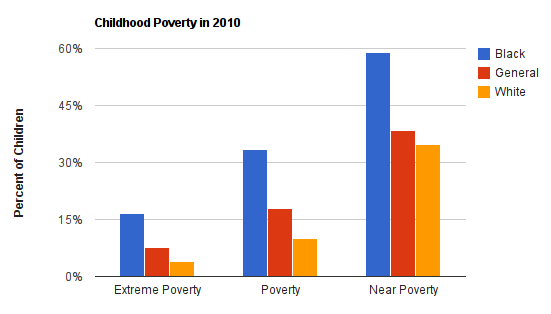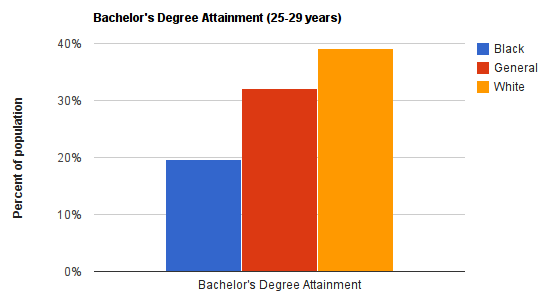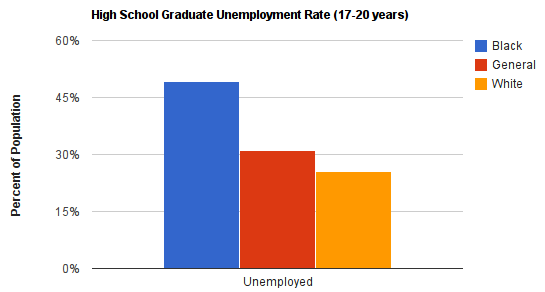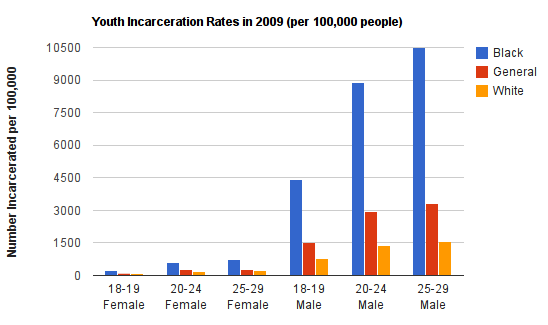I write often about poverty, inequality, and other kinds of suffering in the United States. I usually write in general terms about the country as a whole, but it deserves mentioning that this sort of suffering is not at all evenly distributed throughout the population. Some racial groups face much higher levels of economic and social suffering than others, and blacks tend to face some of the most extreme levels of suffering. Here I detail the obscene levels of suffering visited upon black youth in the United States.
Childhood Poverty
Let’s start with childhood poverty. According to the 2010 Census, 16.6 percent of black children below the age of 18 live in extreme poverty (below half of the poverty line), 33.4 percent live in poverty (below the poverty line), and 59 percent live in poverty or just above it (below twice the poverty line). In all poverty categories, black children far outpace children overall and white children especially.

College Attainment
When talking about the youth, for some reason we love to talk about young college graduates. Even though they are the most economically privileged subset of the youth, their struggles are somehow supposed to be paradigmatic of the younger generation as a whole. That of course raises the question: what does the population of recent college graduates look like? I’ve written before about the upper class tilt of recent college graduates, but there is also a very substantial white tilt as well. According to the Census, 19.6 percent of young black people (ages 25-29 years) have a bachelor’s degree, while 39.2 percent of young white people do. So by percentage of population, young whites are twice as likely to have a bachelor’s degree as young blacks. The above-mentioned poverty rates play a big role in this divide.

High School Graduate Unemployment
With bachelor’s degree attainment rates so dismal for young blacks, we should probably turn our sights on the plight of recent high school graduates who are not pursuing further education. According to an EPI analysis, an astounding 49.1 percent of young black high school graduates (ages 17-20 years) are unemployed. This compares with 31.1 percent of the general population of recent high school graduates, and 25.6 percent of similarly situated whites. So in addition to young blacks being half as likely to obtain a bachelor’s degree, young black high school graduates are twice as likely to be unemployed.

Incarceration
Lastly, let’s take a look at youth incarceration rates. Incarceration is generally a man’s game: women are incarcerated at very low rates relatively speaking. With that said, 0.21 percent of black females 18-19 are incarcerated. That number is 0.6 percent for black females 20-24, and 0.73 percent for black females 25-29. All of those percentages are at least twice the general female incarceration rate and at least triple the white female incarceration rate for those ages.
Of course, the real horror story of black youth incarceration is among the men. Around 4.4 percent of black males 18-19 are incarcerated. That number shoots to 8.9 percent for black males 20-24, and 10.5 percent for black males 25-29. The black youth male incarceration rate hovers around triple the general youth male incarceration rate, and is anywhere from 5.6 to 6.6 times the white youth male incarceration rate depending on the age bracket. No doubt the above-mentioned high poverty rates and high youth unemployment factor heavily into these astounding rates of incarceration.

Conclusion
Black youths face extraordinary levels of poverty, unemployment, and incarceration. Unsurprisingly, this suffering goes untalked about almost everywhere. Instead, we are barraged with daily pieces on student debt and the slightly elevated rates of college graduate unemployment. Of course, this sort of emphasis is entirely predictable. The mild frustrations and stings of the most privileged dominate mainstream discourse about suffering and always have. Make no mistake: if the black youth reality was the white youth reality, it would be a national crisis grabbing the attention of every press outlet and policymaker in the country. But the black youth aren’t the white youth, so we get narratives of recent NYU graduates and student movement masturbation instead.